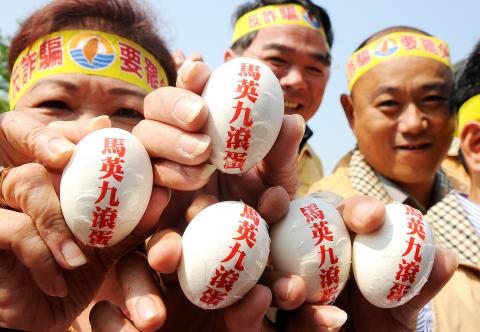The Taiwan Solidarity Union (TSU) and civic groups yesterday urged supporters to participate in various protests to be held around President Ma Ying-jeou’s (馬英九) inauguration ceremony on May 20 to voice their discontent with the administration.
At a massive protest at Huashan 1914 Creative Park, arranged by the TSU for the morning of May 20, people will be invited to throw eggs at a giant LCD screen broadcasting Ma’s inauguration ceremony, TSU Chairman Huang Kun-huei (黃昆輝) said.
Held on the heels of the Democratic Progressive Party’s (DPP) rally the previous day, which will end at the park, the protest is scheduled to begin at 8am and protesters plan to march to “as close as we can get” to the Presidential Office, Huang said.

Photo: Liu Hsin-de, Taipei Times
The TSU’s demonstration intends to highlight Ma’s “cheating the people,” including betraying his pledges to return the ill-gotten party assets of the Chinese Nationalist Party (KMT) and to freeze the prices of fuel and electricity that he had made before the presidential election, Huang said.
The pro-independence Taiwan Nation Alliance has also announced it would stage a four-day protest between May 17 and May 20 on Chingtao E Rd.
Hakka groups in Miaoli, Hsinchu and Taoyuan counties are set to announce their support for the DPP’s protest today at Yimin (Heroes) Temple in Miaoli County.
The groups said in a press release that they would call on Hakka to attend the May 19 rally and voice their anger over Ma’s poor performance, in particular his neglect of infrastructure and cultural preservation in Hakka-populated regions.
Civic groups led by the Alliance of Referendum for Taiwan have scheduled protests from May 13 through May 21 at the Taipei Railway Station.
There has also been an ongoing anti-Ma protest in Taipei — a sit-in by a group of young DPP city councilors on Ketagalan Boulevard.

Alain Robert, known as the "French Spider-Man," praised Alex Honnold as exceptionally well-prepared after the US climber completed a free solo ascent of Taipei 101 yesterday. Robert said Honnold's ascent of the 508m-tall skyscraper in just more than one-and-a-half hours without using safety ropes or equipment was a remarkable achievement. "This is my life," he said in an interview conducted in French, adding that he liked the feeling of being "on the edge of danger." The 63-year-old Frenchman climbed Taipei 101 using ropes in December 2004, taking about four hours to reach the top. On a one-to-10 scale of difficulty, Robert said Taipei 101

Taiwanese and US defense groups are collaborating to introduce deployable, semi-autonomous manufacturing systems for drones and components in a boost to the nation’s supply chain resilience. Taiwan’s G-Tech Optroelectronics Corp subsidiary GTOC and the US’ Aerkomm Inc on Friday announced an agreement with fellow US-based Firestorm Lab to adopt the latter’s xCell, a technology featuring 3D printers fitted in 6.1m container units. The systems enable aerial platforms and parts to be produced in high volumes from dispersed nodes capable of rapid redeployment, to minimize the risk of enemy strikes and to meet field requirements, they said. Firestorm chief technology officer Ian Muceus said

MORE FALL: An investigation into one of Xi’s key cronies, part of a broader ‘anti-corruption’ drive, indicates that he might have a deep distrust in the military, an expert said China’s latest military purge underscores systemic risks in its shift from collective leadership to sole rule under Chinese President Xi Jinping (習近平), and could disrupt its chain of command and military capabilities, a national security official said yesterday. If decisionmaking within the Chinese Communist Party has become “irrational” under one-man rule, the Taiwan Strait and the regional situation must be approached with extreme caution, given unforeseen risks, they added. The anonymous official made the remarks as China’s Central Military Commission Vice Chairman Zhang Youxia (張又俠) and Joint Staff Department Chief of Staff Liu Zhenli (劉振立) were reportedly being investigated for suspected “serious

American climber Alex Honnold is to attempt a free climb of Taipei 101 today at 9am, with traffic closures around the skyscraper. To accommodate the climb attempt and filming, the Taipei Department of Transportation said traffic controls would be enforced around the Taipei 101 area. If weather conditions delay the climb, the restrictions would be pushed back to tomorrow. Traffic controls would be in place today from 7am to 11am around the Taipei 101 area, the department said. Songzhi Road would be fully closed in both directions between Songlian Road and Xinyi Road Sec 5, it said, adding that bidirectional traffic controls would